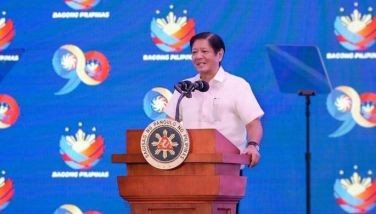10 years validity for passport, 5 for driver’s license

Republic Act No. 10928 extends the validity of Philippine passports from five years to 10 years. File
MANILA, Philippines - President Duterte signed into law yesterday three separate measures that would extend the validity of passports and driver’s licenses, and provide free internet access in public places.
Republic Act No. 10928 extends the validity of Philippine passports from five years to 10 years.
The provision does not apply to minors or those under 18 years old, who will only be issued a passport valid for five years.
The government may limit the validity period to less than 10 years “whenever in the national economic interest or political stability of the country, such restriction is necessary.”
Former president and now Pampanga Rep. Gloria Macapagal-Arroyo, main author of the bill on the extension of passport validity, said she was elated that the measure was signed.
“Extending the passport validity from five to 10 years has been one of the first bills (House Bill 487) I filed at the start of the present Congress because I have always believed that the five-year validity is too short,” she said in a statement.
Arroyo said all their efforts paid off “considering the tedious process and the cost required to renew a passport.”
“With this new law, I am hopeful that Filipinos’ unimpaired exercise of their constitutional right to travel will be enhanced,” she said.
RA 10930, on the other hand, allows the extension of the validity of the driver’s license to at least five years but it can be prolonged to 10 years if the applicant does not commit any violation.
The Land Transportation Office (LTO) was directed to come up with stricter rules on the issuance of driver’s license. These rules include the conduct of theoretical and practical examinations that measure the competency of drivers.
Any officer who issues a driver’s license without the necessary examinations or to an unqualified applicant shall be dismissed from the service.
Applicants who connive with officials for the irregular issuance of licenses, falsify documents, misrepresent information in the application and cheat during examination shall be slapped with a fine of P20,000.
The licenses of erring applicants will also be revoked. They will also be barred from applying for license for two years.
“The repetition of such offense shall warrant the perpetual disqualification from being granted a driver’s license in addition to the fine above stated,” the law read.
The transportation secretary, upon recommendation of the Land Transportation Office, shall have the power to increase or adjust the fines imposed under the law every five years provided that the upward adjustment is not be more than five percent of the fine.
Also signed was RA10929, which establishes a free internet access program in public places.
The law aims to “promote knowledge-building among citizens and enable them to participate and compete in the evolving information and communication age.”
Public places to be covered by the free internet access program are national and local government offices, public basic education institutions, state universities and colleges and Technical Education and Skills Development Authority technology institutions, public hospitals, health centers and rural health units, public parks, plazas, libraries and barangay reading centers, public airports and seaports and public transport terminals.
The Department of Information and Communications Technology (DICT) was authorized to set standards and qualifications in determining which public places shall be included and prioritized in the implementation of the program.
The DICT was tasked to develop a comprehensive plan for the program within one year from effectivity of the law.
The agency was also ordered to ensure that the minimum internet speed per user is two megabits per second as prescribed by the national broadband plan.
A Free Public Internet Access Fund to be managed by the DICT will be created to bankroll the implementation of the program. The fund shall be funded out of the spectrum users’ fees collected by the NTC and other sources to be identified by the budget department. – With Delon Porcalla
- Latest
- Trending































